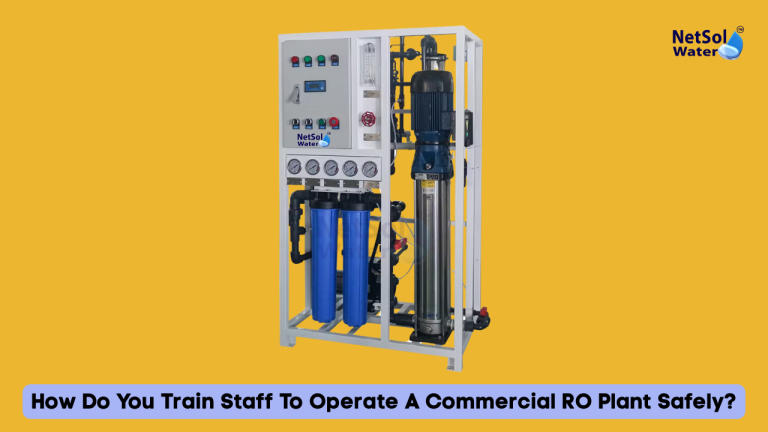
Operating a commercial RO plant is all about knowing, paying attention, and following safety principles. Untrained staff can ruin expensive equipment, compromise water quality, or put themselves at risk. Thus, it becomes essential to train staff to operate a commercial RO plant safely. Training not only causes the plant to run without a hitch but also keeps workers protected and regulatory compliance ensured.
This blog provides the best means of preparing your personnel for effective and safe operation of commercial RO plants.
Why It’s Important to Train Personnel to Safely Run a Commercial RO Plant
Commercial RO plants consist of various components—pumps, membranes, pressure vessels, and chemical dosing systems—which must be handled properly. Furthermore, personnel need to be in charge of monitoring water parameters such as pressure, flow rate, and water quality parameters such as total dissolved solids (TDS).
If the staff members are not trained properly, they may fail to identify early signs of equipment breakdown or water quality issues, and this will lead to costly repairs and compromised water quality. In addition, poor handling of chemicals will lead to exposure of workers to hazardous chemicals.
By investing time and resources to train staff to operate a commercial RO plant safely, organizations can reduce operational errors, improve water quality, extend equipment life, and create a safer working environment.
Main Training Topics for Safe Operation of RO Plants
1) RO Technology and System Components
You should make sure staff understand that RO technology involves removing contaminants and solids when water is forced through membranes. They ought to understand the role of each unit such as pre-filters, pressure pumps, membranes and post-treatment units.
With this knowledge, they understand why safety checks and proper safety measures are important.
2) Taking Part in Hands-On Exercises
One cannot just rely on theory itself. Workers are expected to learn how to start and stop the equipment, adjust settings and finish other maintenance tasks. As a result of this training, everyone working with the system becomes familiar with it and very few errors are likely.
3) Chemical Handling and Safety
RO plants mostly rely on chemicals for performing CIP (cleaning the membrane), adjusting pH or applying anti-scalant agents. Chemicals should be handled properly to avoid accidents. The training must teach how to store substances properly, put on safety gear and handle situations where a chemical is spilled.
4) Monitoring and Troubleshooting
Operators must be taught to frequently monitor key system parameters such as pressure, flow, and water quality. Training would include the application of sensors, reading gauges, and alarm states. Training operators on basic troubleshooting steps can allow them to repair minor problems before they escalate into significant issues.
5) Documentation and Regulatory Compliance
Record-keeping is necessary for plant safety and compliance with water quality. Personnel need to be trained to keep records of operating data, maintenance, use of chemicals, and unusual events or deviations. Record-keeping aids in audits and ensures the plant can meet local government water quality regulations.
Best Practices to Make Training Effective
1) Use Simple, Clear Materials
Training materials should be readable and convenient. Diagrams and videos can help explain difficult concepts. Step-by-step directions and simple language prevent confusion.
2) Develop Interactive Learning
Offer time for personnel to ask questions and debate real-life situations. Rehearsing emergency procedures or performing practice maintenance procedures reinforces training.
3) Daily Refresher Courses
RO plant technology and regulation guidelines may be updated. Refresher training on a continuous basis keeps the workers informed of the current safety procedures and technology, allowing for ongoing safe operation.
4) Test Competency
Testing the knowledge of the staff with quizzes or practical testing ensures that the workers actually know the safety precautions. Trained and competent staff only should operate the plant independently.
Additional Safe RO Plant Operating Tips
1) Personal Protective Equipment (PPE): Wear gloves, goggles, and masks during all work involving chemicals or cleaning the system.
2) Emergency Procedures: Staff should be taught to shut down the system immediately in an emergency and to report incidents.
3) Routine Maintenance: Routine maintenance helps the plant keep running safely and prevent sudden failure.
4) Communication: Open communication among team members avoids errors and ensures everyone follows safety procedures.
Conclusion
For proper and safe operation of a commercial RO plant, it is essential to train staff to operate a commercial RO plant safely. Training includes system basics, hands-on training, chemical safety orientation, monitoring of performance, and documentation.
By giving this training importance, you minimize risks, improve water quality, and extend your equipment’s lifespan. Your staff will be able and prepared to operate the plant safely in daily operations and in case of emergencies.
Finally, effective training is the secret to safeguarding people and equipment and providing clean, pure water day in and day out. By investing in your staff’s skills and safety information, you guarantee long-term success for your commercial RO plant.
Do you need an advice or assistance on selecting the best water and waste water treatment unit? We have solutions for all your problems!
Let us know your problem, our experts will make sure that it goes away.
For an assistance or related query,
Call on +91-9650608473
Or write us at enquiry@netsolwater.com
